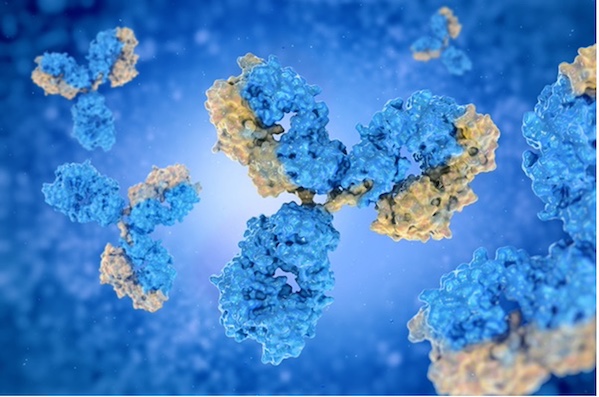Unique Autoantibody Signature to Help Diagnose Multiple Sclerosis Years before Symptom Onset
April 25, 2024
Source: drugdu
 472
472
 Autoimmune diseases such as multiple sclerosis (MS) are thought to occur partly due to unusual immune responses to common infections. Early MS symptoms, including dizziness, spasms, and fatigue, often resemble other conditions, complicating diagnosis, which heavily relies on detailed brain MRI evaluations. MS can severely impair motor control, but advancements in treatment can slow down its progression and help maintain functions such as walking. Notably, around 10% of MS patients begin producing a distinctive set of antibodies against their own proteins years before symptoms appear. These autoantibodies have been found to bind to both human cells and common pathogens, possibly explaining why immune attacks on the brain and spinal cord occur in MS. Now, researchers have identified a unique autoantibody signature in about 10% of MS patients that appears years before the onset of clinical symptoms, raising hopes for early detection via a simple blood test and earlier treatment initiation.
Autoimmune diseases such as multiple sclerosis (MS) are thought to occur partly due to unusual immune responses to common infections. Early MS symptoms, including dizziness, spasms, and fatigue, often resemble other conditions, complicating diagnosis, which heavily relies on detailed brain MRI evaluations. MS can severely impair motor control, but advancements in treatment can slow down its progression and help maintain functions such as walking. Notably, around 10% of MS patients begin producing a distinctive set of antibodies against their own proteins years before symptoms appear. These autoantibodies have been found to bind to both human cells and common pathogens, possibly explaining why immune attacks on the brain and spinal cord occur in MS. Now, researchers have identified a unique autoantibody signature in about 10% of MS patients that appears years before the onset of clinical symptoms, raising hopes for early detection via a simple blood test and earlier treatment initiation.
Utilizing the U.S. Department of Defense Serum Repository, which includes data from over ten million individuals, a team from the University of California, San Francisco (UCSF, San Francisco, CA, USA) and the University of North Carolina at Charlotte (Charlotte, NC, USA) performed whole-proteome autoantibody profiling on samples from hundreds of MS patients both before and after they experienced symptoms. They identified a specific group of patients who exhibited a recognizable pattern of autoantibodies long before any clinical symptoms of MS appeared, accompanied by increased levels of serum neurofilament light (sNfL), which indicates early neuroaxonal damage.
This autoantibody signature was also validated using samples from another MS cohort, confirming its strong specificity for patients diagnosed with MS. This breakthrough could lead to the development of antigen-specific biomarkers for high-risk individuals with clinically or radiologically isolated neuroinflammatory syndromes. While many questions about MS remain—from the triggers of the immune response in certain patients to the disease's progression in the majority who do not exhibit these autoantibodies—researchers are optimistic that they have found a vital early indicator of its development.
"This study sheds light on the preclinical phase of MS and provides a promising avenue for early detection and intervention. Identifying patients at high risk of developing MS before symptom onset could revolutionize patient care and treatment strategies," said Danillo Augusto, Ph.D., an assistant professor in biology at the University of North Carolina at Charlotte.
“Over the last few decades, there's been a move in the field to treat MS earlier and more aggressively with newer, more potent therapies,” said UCSF neurologist Michael Wilson, MD. “A diagnostic result like this makes such early intervention more likely, giving patients hope for a better life.”
Source:
https://www.labmedica.com/molecular-diagnostics/articles/294800948/unique-autoantibody-signature-to-help-diagnose-multiple-sclerosis-years-before-symptom-onset.html
Read more on
- Gusekirumab Injection Accepted by CDE, Multiple Pipelines Advancing Simultaneously March 4, 2026
- Yifan Pharmaceutical’s teriparatide injection has been accepted by the CDE (Center for Drug Evaluation), adding a new domestic player to the osteoporosis treatment field March 4, 2026
- //news.yaozh.com/archive/47318.html PD-1 sales surge March 4, 2026
- A major breakthrough! Roche’s oral BTK inhibitor achieves its third Phase III clinical trial victory, a game-changer in the multi-billion dollar MS (manufactured pharmaceuticals) market. March 4, 2026
- GB19 Injection Approved for Clinical Trials of Cutaneous Lupus Erythematosus March 4, 2026
your submission has already been received.
OK
Subscribe
Please enter a valid Email address!
Submit
The most relevant industry news & insight will be sent to you every two weeks.



